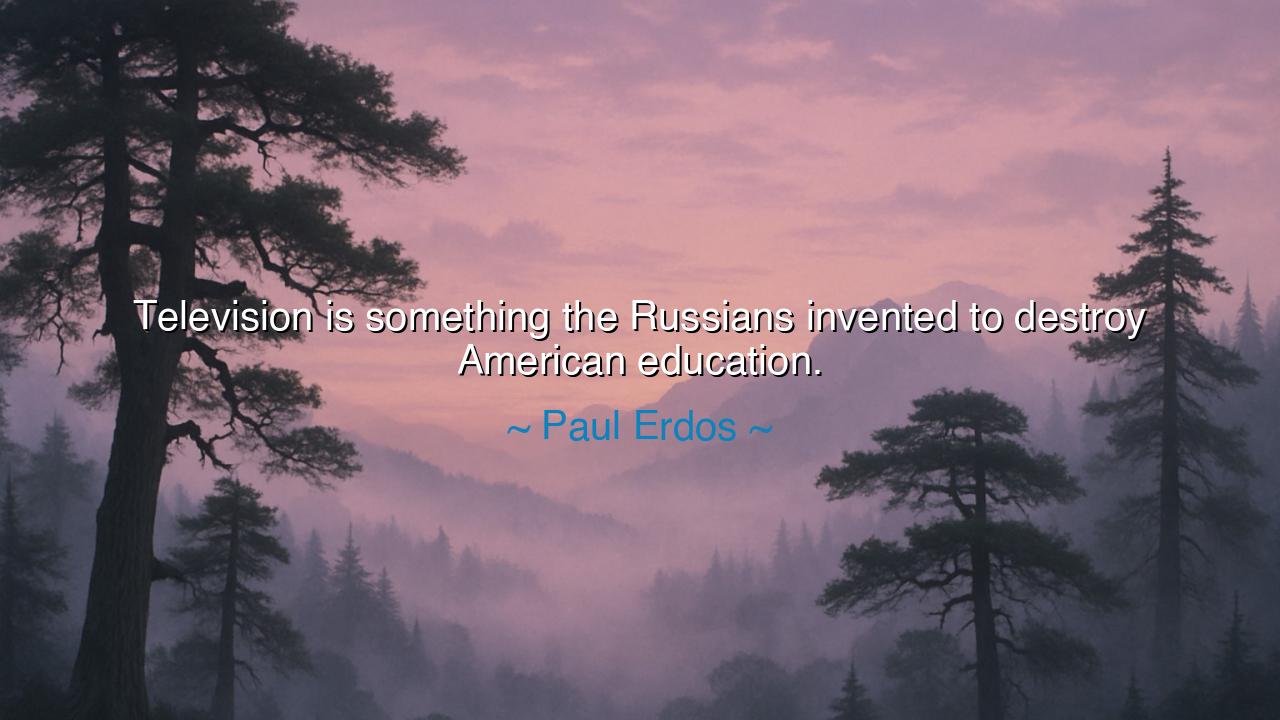
Television is something the Russians invented to destroy American






The mathematician Paul Erdős, whose mind soared through the infinite beauty of numbers, once said with wry humor, “Television is something the Russians invented to destroy American education.” Though spoken in jest, these words hold within them a deep lament for a world losing its hunger for knowledge. Beneath his humor lies the sorrow of a thinker who watched a generation trade the fire of curiosity for the flicker of a screen. In that sentence, Erdős speaks not merely of nations, but of an ancient struggle — the struggle between distraction and discipline, between the mind that seeks truth and the mind that seeks ease. His warning resounds even louder in our age, where the glowing screens have multiplied and the silence of contemplation has grown scarce.
To understand his meaning, we must remember that Erdős was not a man of luxury or idle complaint. He was a wanderer of wisdom, a pilgrim of mathematics who lived from notebook to notebook, traveling across continents with only his thoughts and his friendships. He saw in education the sacred art of awakening — the slow, demanding process of training the intellect and the soul. When he joked that television was an invention meant to “destroy education,” he was pointing to how entertainment, when worshiped, replaces enlightenment. It is not the device itself that is evil, but the spirit of passivity it breeds. The ancients said that the mind grows in proportion to its labor. But when the mind no longer labors — when it merely consumes — it becomes weak, unanchored, and easily led.
In ancient Greece, Plato warned of this very danger, long before screens existed. He feared that future generations, relying too heavily on the written word, would lose the discipline of memory and the art of dialogue. How much greater, then, would his concern be in our time, when even reading is replaced by images flashing faster than thought? Education, as Erdős saw it, requires silence, patience, and struggle — three virtues that television erodes. The student who once sat in awe before a teacher now sits before a spectacle, eyes open but soul asleep. And thus, slowly, a civilization built on thought begins to drift toward forgetfulness.
Yet, history also offers hope. After the Second World War, nations rebuilt not through distraction, but through discipline. Japan, ravaged by war, turned its eyes not to entertainment, but to education — cultivating generations of engineers, inventors, and dreamers. In contrast, other societies, drowning in comfort, let their curiosity dim. Erdős saw this divergence and trembled. For he knew that knowledge, once neglected, cannot easily be revived. A mind lulled by pleasure forgets how to seek truth. A people fed by endless amusement lose the strength to ask why.
Erdős’s humor hides a deeper truth: that every civilization stands upon its teachers. When their work is ignored, when learning is mocked or replaced by convenience, the pillars begin to crack. Television, in his metaphor, becomes the symbol of surrender — the surrender of depth for distraction, of wonder for entertainment. And though the “Russians” were never truly its inventors, Erdős uses their name to represent any power, internal or external, that dulls a people’s intellect and steals their love of wisdom.
But let us not despise the screen; let us rather master it. For even in its light, there is potential — if guided by purpose. A tool can either enslave or enlighten depending on the hand that wields it. Thus, the lesson is not to flee technology, but to rule it with the same discipline the ancients brought to philosophy and mathematics. Let the mind remain the master and the machine its servant. When the screen is used to teach, to inspire, to illuminate the unknown, it becomes an ally of education, not its destroyer.
The teaching of Paul Erdős calls us back to balance — to reclaim the sacredness of learning. Turn off the noise from time to time, he seems to say. Sit in stillness. Read, ponder, question, calculate. For in that silence, the mind returns to its true nature — creative, curious, and free. The human spirit was not made to be entertained; it was made to understand. And only when we remember this can education once again be what it was always meant to be — the noble pursuit of truth that outlives empires and endures beyond every glowing screen.
So, O seekers of wisdom, heed this paradox spoken in jest. Do not let the age of spectacle become the age of forgetting. Let your attention be your offering, your curiosity your prayer. For in a world of endless noise, the act of truly learning — of turning inward to think — is the most revolutionary act of all.






AAdministratorAdministrator
Welcome, honored guests. Please leave a comment, we will respond soon